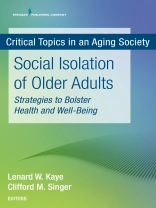Critical strategies for confronting a dire, yet under-addressed societal epidemic—the risky and potentially deadly consequences for older adults living a socially isolated life, are the focus for this book. By documenting our current understanding of the complex and multi-dimensional nature of social isolation among elders, the authors highlight innovative and alternative forms of community and later-life relationships that can serve to forestall or prevent social isolation and loneliness.
With contributions from recognized scholars, clinicians, and elder-policy activists, as well as from multiple practice perspectives (direct service providers, administrators, researchers, and educators) the book documents the interrelated issues of social relationships and health in late life. It describes creative programs and intervention techniques that help maintain the integrity of an older adult’s individual, group, and community relations, communication pathways, and a sense of belonging. The book also illuminates multidisciplinary and integrated best practices for minimizing the risk of late life social isolation. Case studies showcase the issues that arise in clinical practice and service delivery and demonstrate proven methods for effectively addressing them.
Key Features:
- Delivers best-practice strategies and interventions for bolstering older adult social health and community engagement
- Written by top scholars in the gerontology community
- Explores the life-threatening risks and consequences of social isolation for older adults and their families
- Describes the wide range of social relationships that can determine the extent to which older adults will be at risk of becoming socially isolated
- Considers the role that older adult diversity and difference plays in determining quality of life and the integrity of relationships
- Highlights physical, behavioral, environmental, social, and economic forces that can influence the quality of late life relationships
Inhoudsopgave
Contributors
Preface
PART I. Setting the Context
1. The Scourge of Social Isolation and Its Threat to Older Adult Health
Lenard W. Kaye and Clifford M. Singer
2. Historical Perspectives on the Research of Social Isolation, Loneliness, and Social Support
Mary Lou Ciolfi
3. Making the Case: The Clinical Value of Assessing Older Adults’ Social Isolation, Loneliness, and Social Relationships
Sarah Pillemer, Chelsea Schoen, and Sloane Sheldon
4. International Perspectives on Social Relationships, Social Isolation, and Well-Being Among Older Adults
Howard Litwin
PART II. Proven Strategies and Programs for Promoting Social Integration and Health
5. Friend Power—A View From the Front Lines:
The Importance of Relationships in the Lives of the Disabled, People With Dementia, and Older Adults
Hope Reiner
6. Physical Activity for Older Adults: Supporting Social Integration
Marilyn R. Gugliucci, Erica Robertson, Susan Wehry, and Shirley A. Weaver
7. Designing Age Friendly Communities as a Strategy for Enhancing Social Connectedness
Patricia Huffman Oh
8. Healthy Places and the Social Life of Older Adults
Keith Diaz Moore, Ivis Garcia, and Ja Young Kim
9. Volunteering as a Strategy for Combatting Social Isolation
Jennifer A. Crittenden
10. Using Technology to Advance Social Health
Hiroko H. Dodge
11. Spirituality and Religion in the Lives of Elders
Kenneth J. Doka
12. Involving Our Pets in Relationship Building—Pets and Elder Well-Being
Aubrey H. Fine and Erika Friedmann
PART III. Special Challenges Influencing Social Connectedness in Later Life
13. Social Networks and Social Isolation Among LGBT Older Adults
Sandra S. Butler
14. Family and Intergenerational Relationships
Donna M. Butts and Kristin Bodiford
15. Rethinking Love, Intimacy, and Sexual Relationships in the Later Years
Nicholas Velotta and Pepper Schwartz
16. The Gendered Nature of Later Life Relationships
Edward H. Thompson, Jr. and Kate de Medeiros
17. The Social Implications of Growing Old in Small Towns and Rural Communities
Kristina M. Hash, Deana F. Morrow, and Mandana R. Weirich
Appendix: Resources on Older Adult Social Isolation and Relationships
Lisa Dezso
Index
Over de auteur
Clifford M. Singer, MD, serves as chief of geriatric mental health and neuropsychiatry at Acadia Hospital and Eastern Maine Medical Center (EMMC) in Bangor, Maine and an adjunct professor at the University of Maine.












